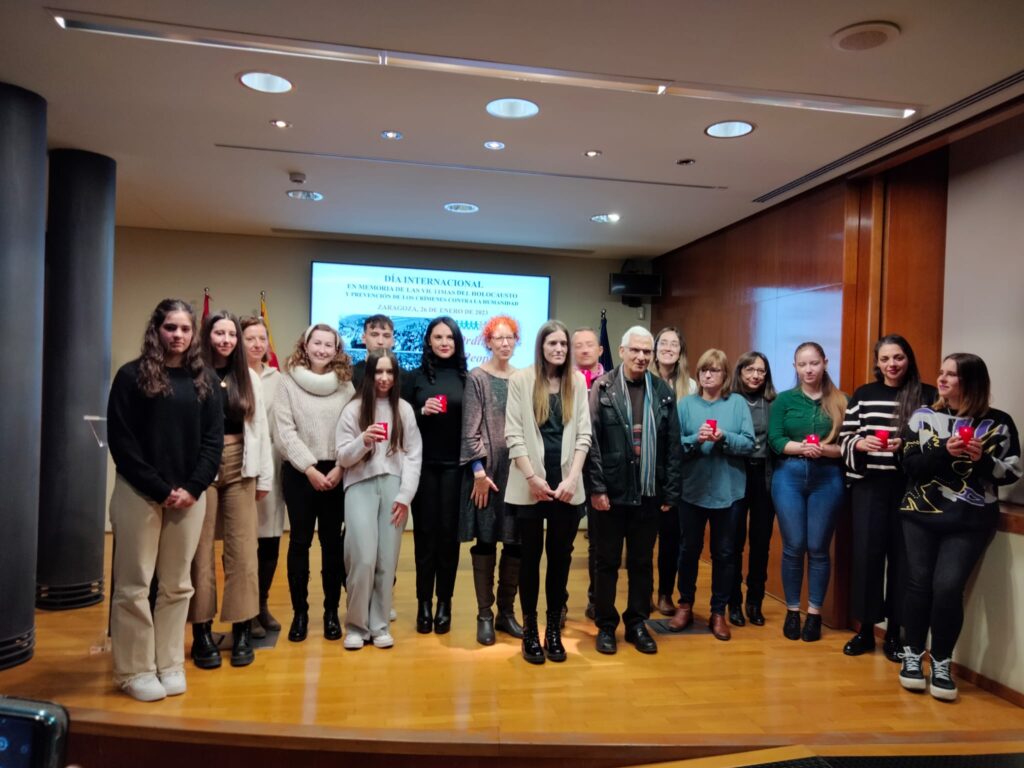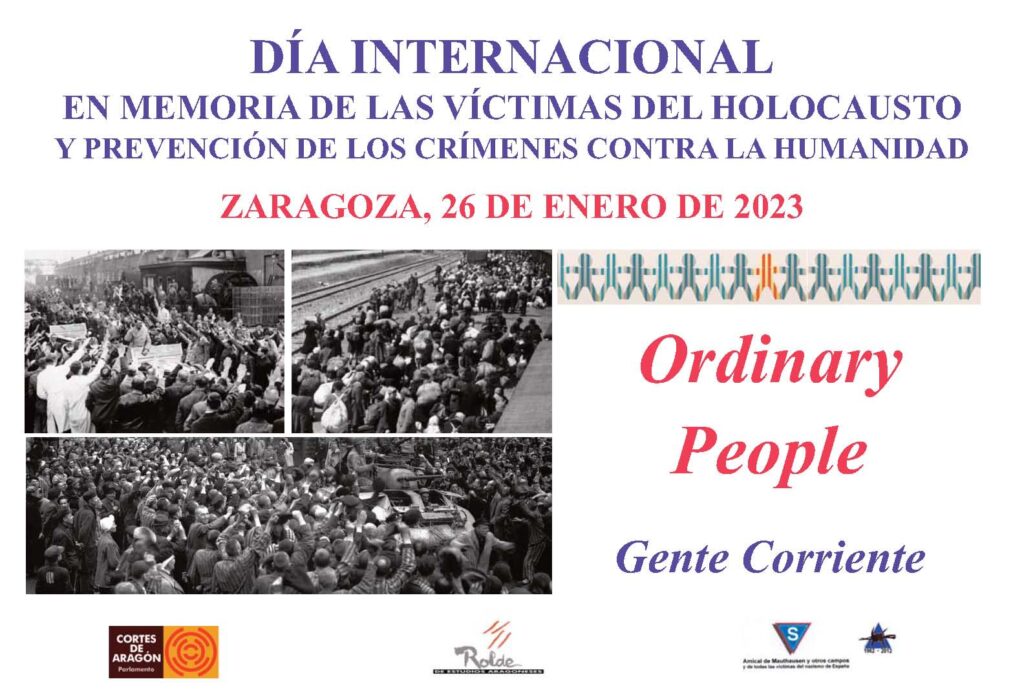Esta entrada también está disponible en: Aragonés Català Español Français English
UNDERSTANDING HATRED
Can you imagine living hidden behind a wall or under the floor? I get claustrophobic thinking about it. I’m sure you do too. I get overwhelmed and I want to think about something else quickly. But, if I dare to keep thinking about it, I realise that surely being locked up and bored wasn’t the worst thing of all, surely the worst thing was the fear of being discovered and killed at any moment. Don’t you think? What would be worse for you?
Unwittingly, I end up thinking about the hatred that someone who wishes such a horrible evil on people he doesn’t even know and will never hear about must feel inside. As an exercise, to see if I understand, I try to imagine the person I hate most in the world. I think of my brother who spoiled me the other day with the series I was watching and I know I would never wish anything like that on him. Maybe I’d dare with the idea of his favourite series being cancelled or losing a lot of followers on Instagram, but, even if it pissed me off, I’d never send him to a concentration camp and I don’t understand who could do that to another human being.
I was shocked when I saw the number, around a thousand Aragonese were in concentration camps. I can’t even imagine what they must have lived through. But I do know how I could discover some of their stories. Below you will see where.
Description
Day of remembrance and homage to the victims of Nazism during the 1930s and 1940s and, by extension, to denounce crimes inspired by hatred and hostility towards diversity. International Day established by the United Nations in 2005, with a recommendation for monitoring and dissemination to public institutions (especially parliaments).
Further information (global):
- United Nations website, and within it, for example, this news item.
- Holocaust Memorial Day Trust website.

In Aragon…
Since 2010, a central event has been held in the Cortes de Aragón, at the initiative of Amical de Mauthausen and Rolde de Estudios Aragoneses. Candles are lit and brief speeches are made in remembrance and representation of the groups that suffered the harshest deportation and extermination. Given the educational and learning tone in this context, the participation of secondary school students is very important.
Information of the 2023 event (with several links, including the recording of the event on the Cortes de Aragón channel), on the Rolde de de Estudios Aragoneses website:


The Sefarad Aragón association (which collaborates in that tribute on behalf of the Jewish people) also usually organises a more specific commemorative event on its own and promotes projects (conferences, courses, etc.) during other times of the year.
A detail
Around a thousand Aragonese men and women were deported to concentration and extermination camps. It is also worth remembering the work of Aragonese who contributed to saving lives (such as the diplomats Ángel Sanz Briz in Hungary and Sebastián Romero Radigales in Greece).
Further information
- Web Aragonese deported to Nazi camps.
- Collective book Justice and Dignity. Aragonese memory of the Holocaust. Zaragoza, REA, 2020.

The objectives and contents of this proposal can be related to those linked to Human Rights Day (10 December) and Democratic Memory Day in Aragon (3 March).
Suggestions for teachers
Documentary The last Spaniards of Mauthausen and the other Nazi camps, by Carlos Hernández (2020, 80 minutes).
The Amical Association of Mauthausen and other camps has a wide range of talks and lectures, largely aimed at schoolchildren (preferably secondary and high school students). It also offers exhibitions and trips to concentration camps. It has a delegation in Aragon.
The Amical has a project, the Memory Network Never More, which proposes working with town councils, associations and organisations in each municipality, and with secondary schools or educational centres, to involve young people, and to do so through the stories or biographies of the deportees in each locality.

There is a filmography on Ángel Sanz which may be useful. It is referenced in the aforementioned book Justice and Dignity, but we can highlight here:


Based on these premises, a series of activities can be developed for students: screening of some of the audiovisual works, exploration of some of the pages referred to, a simple questionnaire to gauge understanding of the content, a search for information about some of the issues raised, exploration of experiences or memories on the subject in the family context, exchange of ideas and opinions, composition of a text…

Cross-cutting element included in the curriculum
This proposal reinforces the development of values inherent in the principle of equal treatment and non-discrimination on the basis of any personal or social condition or circumstance, and encourages learning about the prevention and peaceful resolution of conflicts in all areas of personal, family and social life, as well as the values that underpin freedom, justice, equality, political pluralism, peace, democracy, respect for human rights and the rejection of terrorist violence, plurality, respect for the rule of law, respect and consideration for the victims of terrorism and the prevention of terrorism and any kind of violence. (…).
The teaching programme must in all cases include the prevention of gender-based violence, terrorist violence and any form of violence, racism or xenophobia, including the study of the Jewish Holocaust as a historical fact. Sexist behaviour and content and stereotypes that lead to discrimination will be avoided.
Objectives that this proposal helps to meet
ESO:
- To assume responsibly their duties, to know and exercise their rights in respect for others, to practice tolerance, cooperation and solidarity among individuals and groups, to exercise in dialogue, strengthening human rights and equal treatment and opportunities between women and men, as common values of a pluralistic society, and to prepare for the exercise of democratic citizenship.
- To value and respect the difference between the sexes and the equality of rights and opportunities between them. Reject discrimination against people on grounds of sex or any other personal or social condition or circumstance. Reject stereotypes that discriminate between men and women, as well as any manifestation of violence against women.
Baccalaureate:
- To exercise democratic citizenship, from a global perspective, and acquire a responsible civic conscience, inspired by the values of the Spanish Constitution, as well as by human rights, which fosters co-responsibility in the construction of a just and equitable society.
- To consolidate personal and social maturity that allows them to act responsibly and autonomously and to develop their critical spirit. To foresee and resolve personal, family and social conflicts peacefully.
- To promote effective equality of rights and opportunities between men and women, to analyse and critically assess existing inequalities and discrimination, and in particular violence against women, and to promote real equality and non-discrimination of people for any personal or social condition or circumstance, with special attention to people with disabilities.
Subjects with which it can be linked
- Geography and History / Ethical values (ESO, 1st and 2nd cycles)
- Education for citizenship and human rights (ESO, 2nd cycle)
- Baccalaureate: To be assigned according to modality
Development of competences
Social and civic competences
